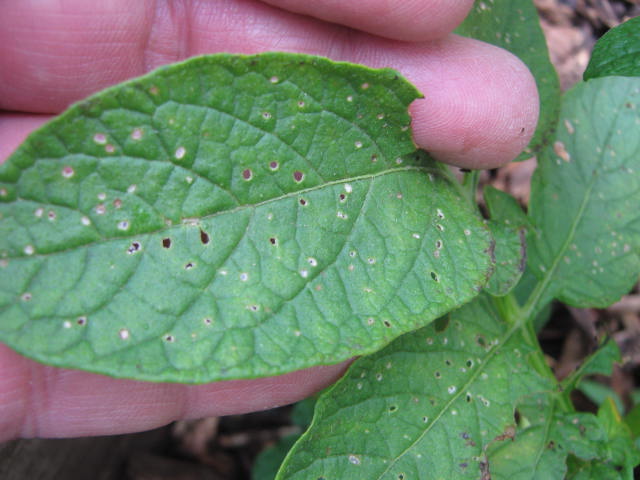We’re seeing the first flea beetles in the garden this season. These tiny pests can cause a lot of damage to small plants if they’re not knocked back early on.
Usually the first thing you see when flea beetles enter your garden is the distinctive chewing pattern they make on the leaves and not the beetle itself. Flea beetle damaged leaves are riddled with small holes. Imagine what would happen if a garden fairy took its tiny shotgun and blasted away at the leaves, that’s what flea beetle damage looks like.
The beetles themselves are black and less than 1/16″ long. They sometimes will jump, sort of like a flea, when disturbed.
Like many insects, they have their favorite foods. In our garden eggplant and potatoes are the first to be gnawed followed by tomatoes then all of the other vegetable plants.

Numerous small holes are indicative of flea beetle damage. Vigorous plant s are usually able to shrug off a flea beetle attack.
The greatest danger to the garden is when the plants are small and growing. At that young stage flea beetles can stunt or even kill plants. As the plants get larger, they can sustain much more feeding by the beetles.
Fertile soil and timely watering will help plants stay healthy and grow past that vulnerable stage.
A homemade concoction made from garlic and hot peppers will fend off the beetles for a while. Take a half dozen cloves of fresh garlic and crush them up. Add the garlic along with a tablespoon of dried, crushed red pepper to a quart of water. Let it steep for a couple of days. Strain the mixture. Spray it onto your plants every three days or so to chase away the flea beetles.
If you have a really bad infestation or a big garden, you can use any garden spray or powder that is labeled for killing beetles in the vegetable garden. Organic gardeners can use that old stand-by rotenone. Pyrethrum or spinosad, both considered organic insecticides, are good too.
Bob